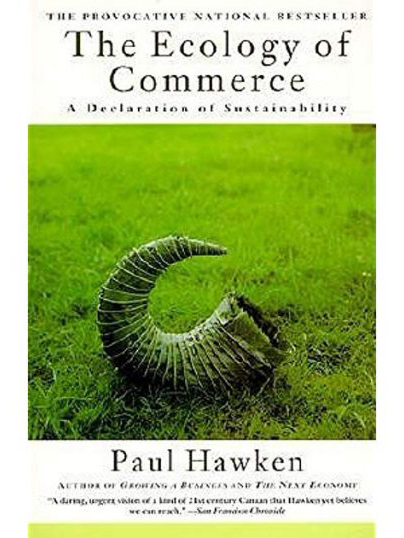This is how business can be the driver of positive climate change

In my frequent episodes of anxiety about climate change, this is a favourite book I turn to for encouragement. Amazingly, it was published in 1993 even then, the climate crisis and the pivotal role of business was clear if you chose to look at it. Whilst details have been superseded, the essence of the message remains hugely valuable: in 2015, it was voted the best college text on these issues by professors in 67 US business schools.
The core of his message can be summed up in two sentences. “Without doubt, the single most damaging aspect of the present economic system is that the expense of destroying the earth is largely absent from the marketplace.” “Ironically, business contains our blessing. It must, because no other institution in the modern world is powerful enough to foster the necessary changes…”
The book provides a practical exploration of how to transform the role of business along these lines, and one of the many reasons I like it is that he uses principles from ecology as a model. Connecting with these basic analogies can really help us see the wood for the trees, for example: “waste equals food. In nature, detritus is constantly recycled to nourish other systems…” “Nature runs off current solar income.” At this simple level, the problems with our current financial system are glaringly clear.
The practical steps which Hawken suggests to transform the impact of business still look wise and practicable to me, twenty-seven years on. One of the central changes is a shift to taxation primarily on CO2 use and environmental impacts, but he suggests that the changes are announced and then implemented progressively over twenty years, ie a five percent change each year from current tax systems to green taxes. This would mean that business does not have a sudden somersault to perform, but knows that the rules of the game are changing steadily year by year.
He also has an interesting proposal for an ‘intelligent product system,’ in which all products would be within one of three categories:
- Consumables: products which are used and then disposed of, all biodegradable.
- Products of service, ie durables such as cars, fridges etc. These would be licensed by the manufacturer to the customer: they cannot be thrown away, but must be returned to the manufacturer, who would therefore be accountable for their recycling.
- Unsaleables: this would include toxic chemicals and other items where we currently don’t know how to dispose of them or recycle safely. These could not be sold, but only ‘rented:’ the original manufacturer would pay for storage of such products once used, until a safe disposal method is found.
Like many other observers, Hawken is an advocate of re-localisation. He quotes an eloquent comment from Wendell Berry: “We have allowed our suppliers to enlarge our economic boundaries so far that we cannot be responsible for our effects on the world. The only remedy for this that I can see is to draw in our economic boundaries, shorten our supply lines, so as to permit us literally to know where we are economically.”
However, Hawken recognises the huge efficiency in mass production and international trade, and being realistic, advocates limiting this rather than replacing it. He writes about ‘guardian governance,’ as found in tribal societies, where trading relationships are person-to-person, and balance with Nature is inherent. He contrasts this with open trading cultures, which tends to be innovative but also impersonal. Each of these approaches has value, and it would surely improve our quality of life and environmental impact if more of our transactions reflected the guardian approach.
Hawken is well qualified to write this book, as he is a successful business entrepreneur, and has worked with a number of progressive large businesses, such as Interface, who changed to a sustainable business model after their CEO read this book. It is worth checking out Hawken’s other books, especially Natural Capitalism, and Blessed Unrest, which is a really encouraging book describing the thousands of mostly small and unsung community groups and other projects who are making a great contribution to environmental and social progress. His main project for several years has been promoting practical solutions to climate change: see https://www.drawdown.org/
The ecology of commerce offers plenty of encouraging examples of businesses who are making progressive change, along with soberingly clear insights about the huge problems of the current financial system. Some of these, like the huge power that large corporations wield, will be hard to change: we all need to hope, believe, and act towards having enough levers of change to reorient the rules of business and a role that is a primary leader in responding to the climate crisis.
